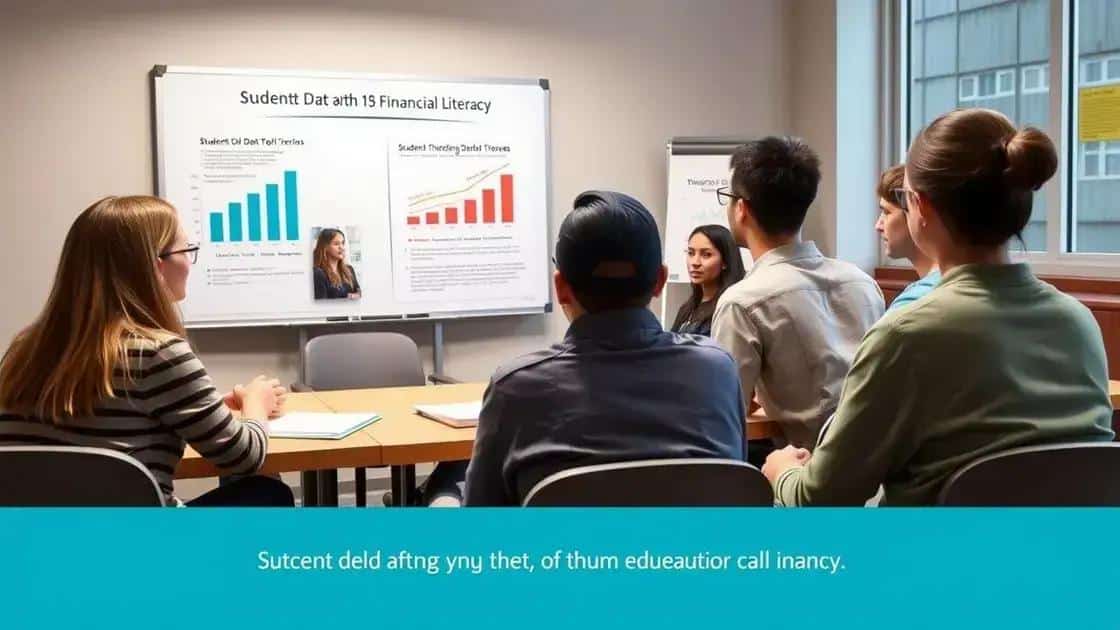Student debt: How to manage your financial future

Anúncios
Student debt significantly affects financial decisions and personal choices for millions, making it essential to understand options for management, repayment, and alternative financing models to secure a better financial future.
Student debt affects millions of individuals, shaping their financial decisions long after graduation. Have you considered how these loans influence your life choices? Let’s explore the nuances and management of this pivotal issue.
Anúncios
Understanding the basics of student debt
Understanding student debt is crucial for anyone entering college or university. With many students relying on loans to finance their education, grasping the basics can make a significant difference in future financial health.
Student debt often stems from federal and private loans, each having unique terms and interest rates. Navigating these options can be overwhelming, but knowing what to look for is important.
Types of Student Loans
There are mainly two types of student loans: federal and private. Federal loans usually have lower interest rates and more flexible repayment options.
Anúncios
- Federal loans include Direct Subsidized, Direct Unsubsidized, and PLUS loans.
- Private loans often require a credit check and may involve higher rates.
- Understanding the differences can help students choose wisely.
In addition to loans, scholarships and grants can significantly reduce the amount of debt a student incurs. These funds do not require repayment and can ease the burden of rising tuition costs.
Borrowing Wisely
As you consider taking out loans, it’s essential to borrow only what you need. Planning a budget can help you determine your financial requirements accurately. Be sure to include living expenses, books, and supplies in your calculations.
Many students underestimate the total cost of their education, leading to excessive borrowing. This can create challenges during repayment. With student debt on the rise, approaching loans with caution is key.
Ultimately, the journey of understanding student debt begins with knowledge. By learning about loan types and financial planning, students can make informed decisions that support their future success.
The impact of student loans on your life

The impact of student loans can be significant in various aspects of your life. Many students may not realize how deeply these loans can affect their financial future and personal choices.
Once you graduate, your student debt can define your financial landscape for years to come. New graduates often face high monthly payments that may limit their ability to save or invest.
Financial Influence
Many young adults find themselves trapped in a cycle of debt. The stress of repaying loans can influence life decisions, such as buying a house or starting a family.
- Monthly loan payments can take a significant portion of your income.
- Delayed payments may lead to higher interest rates and additional fees.
- Financial stress can impact mental health and overall well-being.
On the flip side, understanding the long-term effects of student loans can empower you to make informed choices. It’s essential to be aware of alternative loan repayment options and potential forgiveness programs.
Career Choices
Furthermore, student debt may shape the careers you pursue. Some graduates feel pressured to accept higher-paying but less fulfilling jobs just to manage their loan repayments.
Others might choose careers in public service with lower pay, hoping for loan forgiveness. Understanding your options can help you navigate this challenging landscape while pursuing your passions.
In essence, the impact of student loans extends beyond financial limits. It influences decisions about work, lifestyle, and future plans, making it vital to approach student debt strategically.
Strategies to manage and reduce student debt
Managing and reducing student debt is vital for financial health. There are several strategies that can help students and graduates navigate the challenges that come with borrowing.
One of the first steps is to understand your loans clearly. This includes knowing the interest rates, terms, and monthly payments. Keeping track of your debt can prevent it from becoming overwhelming.
Budgeting Effectively
A solid budget is essential for managing student debt. Create a monthly budget that includes all necessary expenses and loan payments. This approach allows you to see where your money goes and adjust accordingly.
- Identify fixed expenses, such as rent and utilities.
- Allocate funds for groceries and transportation.
- Set aside payments for student loans first.
Once you have a budget, stick to it. This discipline helps avoid accumulating more debt and ensures that you are paying off existing loans actively.
Exploring Repayment Options
Many borrowers may not be aware of various repayment options available for student loans. Federal loans offer different plans like income-driven repayment, where payments adjust based on your income.
Consider refinancing your loans as well. While refinancing can simplify payments, it’s essential to assess whether this option is financially wise based on interest rates.
In addition to refinancing, look into loan forgiveness programs. These programs are available for those working in public service or non-profit jobs, providing relief from some or all of the debt.
To effectively tackle student debt, consistency is key. Regular payments, budgeting, and exploring options can lead to substantial savings and less worry in the long run.
Future trends in student debt and education financing

The future of student debt and education financing is evolving. As educational costs continue to rise, new trends are emerging to help manage financing.
One significant trend is the increase in income-driven repayment plans. These plans adjust monthly payments based on your earnings, making it easier for borrowers to stay current on their loans, without falling into default.
Innovations in Education Financing
Another trend is the rise of alternative funding models. Some institutions are exploring options like income share agreements (ISAs). With ISAs, students receive funding for their education in exchange for a percentage of their future income for a set period.
- ISAs can reduce the financial burden for students without requiring traditional loans.
- These agreements often align the interests of students and schools.
- Schools have a vested interest in the success of their graduates.
Additionally, there is a growing emphasis on financial literacy. Many colleges and universities are offering workshops to improve students’ understanding of student debt management, loan terms, and budgeting skills. Educating students on these topics can empower them to make better financial choices.
Policy Changes and Their Impact
Policy changes also play a critical role in shaping the future of education financing. Proposals for student loan forgiveness are gaining momentum, aiming to alleviate the burden of student debt for millions.
Furthermore, increased federal and state funding for education can help reduce tuition costs. More scholarships and grants will help ensure that students have access to funds that do not need to be repaid.
Ultimately, the landscape of student debt and education financing is likely to keep changing. Staying informed about these trends can help students navigate their financial futures more effectively.
FAQ – Frequently Asked Questions about Student Debt and Education Financing
What are the different types of student loans?
The main types of student loans are federal loans, which include Direct Subsidized, Direct Unsubsidized, and PLUS loans, and private loans from banks or other lenders.
How can I effectively manage my student debt?
To manage your student debt, create a budget, understand your loan terms, and explore repayment options such as income-driven plans and refinancing.
What is an income share agreement (ISA)?
An income share agreement is a funding model where students receive money for their education in exchange for a percentage of their future income for a specified time.
Are there any loan forgiveness programs available?
Yes, there are loan forgiveness programs for borrowers working in public service or non-profit jobs, which can alleviate some or all of their student debt.






